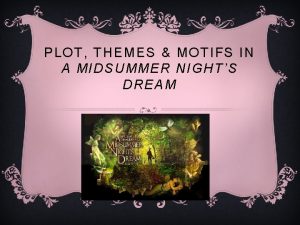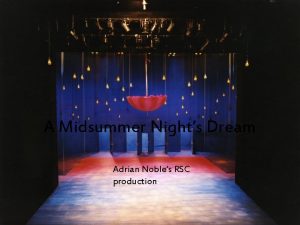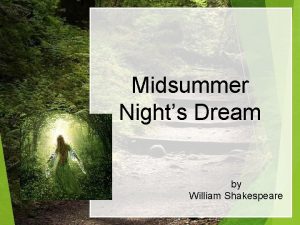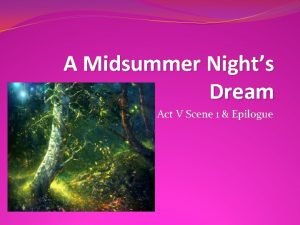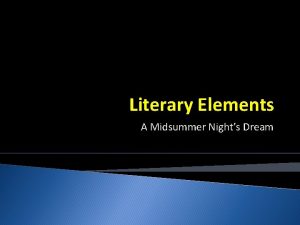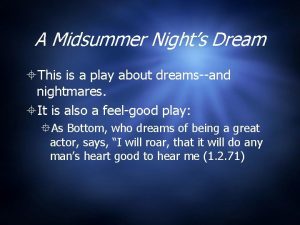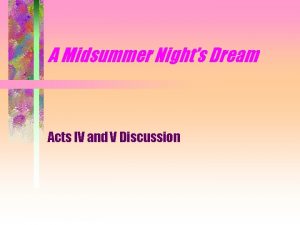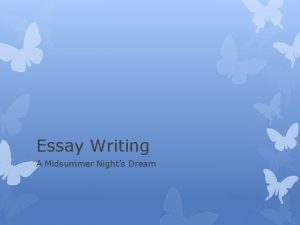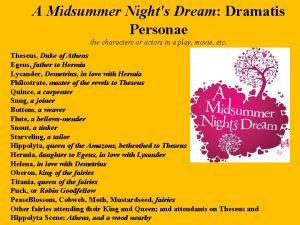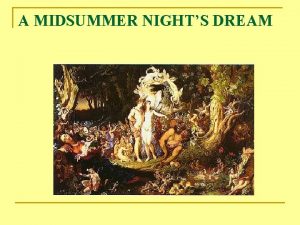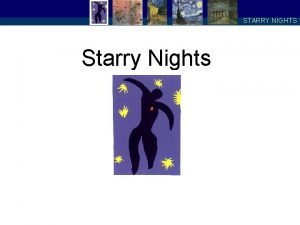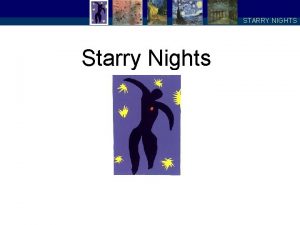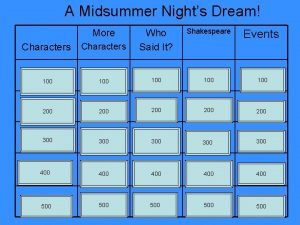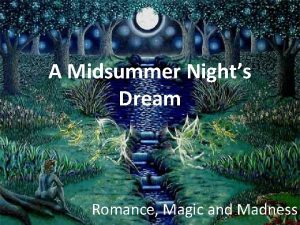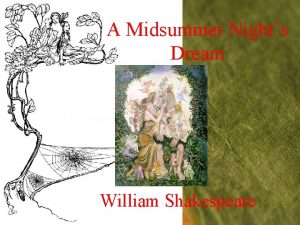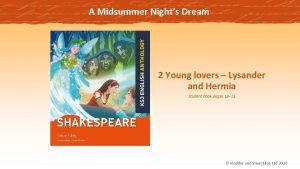A MIDSUMMER NIGHTS DREAM SOURCES Unlike most of














- Slides: 14

A MIDSUMMER NIGHT’S DREAM

SOURCES Unlike most of Shakespeare's dramas, A Midsummer Night's Dream does not have a single written source. The story of "Pyramus and Thisbe" was originally presented in Ovid's The Metamorphosis, making it one of many classical and folkloric allusions in the play. Other allusions include Theseus and Hippolyta's wedding, which is described in Chaucer's "Knight's Tale" in The Canterbury Tales, while theme of a daughter who wants to marry the man of her choice despite her father's opposition was common in Roman comedy. The fairies that dance and frolic throughout this play were most likely derived from English folk tradition. On the one hand, these creatures have a sinister side — Puck, for example, is also known as Robin Goodfellow, a common name for the devil — but they can also be viewed as fun-loving nature spirits, aligned with a benevolent Mother Nature. The interaction of this eclectic array of characters — from the classically Greek royalty such as Theseus (derived from Plutarch's tale of "Theseus" in his Lives of the Noble Grecians and Romans) to more traditionally Celtic fairies such as Puck — emphasizes Shakespeare's facility in using elements of the old to create something completely new.

PLOT SUMMARY . . . Only four days remain until the marriage of Theseus, Duke of Athens, to Hippolyta, Queen of the Amazons. When eager Theseus bemoans how lazily the hours pass, Hippolyta observes: Four days will quickly steep themselves in night; Four nights will quickly dream away the time; And then the moon, like to a silver bow 1 New-bent in heaven, shall behold the night Of our solemnities. (1. 1. 9 -13). . . To prepare for the wedding, Theseus orders his master of revels, Philostrate, to “Stir up the Athenian youth to merriments; / Awake the pert and nimble spirit of mirth” (1. 1. 15 -16). After Philostrate leaves to go about his task, one of the duke’s subjects, Egeus, arrives with a complaint about his headstrong daughter, Hermia. With him besides Hermia are two Athenian youths, Lysander and Demetrius. Egeus has commanded his daughter to marry Demetrius, but she has vowed instead to marry Lysander. Egeus now wants Hermia to swear before the duke that she will marry Demetrius or suffer the penalty of an ancient law decreeing that a disobedient daughter shall either be put to death or banished. After hearing the full complaint, Duke Theseus reminds Hermia of her duty to obey her father, saying, “To your father should be as a god” (1. 1. 51

n The duke then warns her that if she does not change her mind on this matter before the new moon, he will have no choice but to enforce the ancient law. Hermia and Lysander decide they will steal away to the woods the following night, and Hermia confides the plan to her friend Helena. Bad move. Helena is a blabbermouth who loves the man Hermia rejected, Demetrius. To gain favor with him, she informs him of Hermia’s plan. . . . Meanwhile, tradesmen in Athens plan to put on a play as part of the festivities celebrating the wedding of Theseus and Hippolyta. Among them are Bottom, a weaver; Snout; a tinker; Snug, a joiner; Quince, a carpenter; and Flute, a bellows-mender. Their play is to be called The most lamentable comedy, and most cruel death of Pyramus and Thisby 2. Although the workmen know nothing of play-making, they fancy themselves great wits and great actors. When Bottom is told he will play Pyramus, a young man who kills himself after mistakenly thinking his beloved Thisby is dead, Bottom predicts he will be a hit who will win the audience’s sympathy: “That will ask some tears in the true performing of it: if I do it, let the audience look to their eyes; I will move storms. . . ” (1. 2. 14).

n . . . To avoid the scrutiny of curious eyes, the actors decide to rehearse in the woods on the morrow. In the woods are fairies who have traveled from India to pronounce their blessing on the bed of Theseus and Hyppolyta. But all is not well with fairykind, for the queen of the fairies, Titania, will not give her husband, King Oberon, a changeling 3 boy he wants as a page. Oberon and Titania argue violently over the boy, so violently that the forest elves take refuge in acorn cups. But Titania stands fast. In revenge, Oberon orders his fairy mischief-maker, Puck, to harvest a magical flower whose juice, when squeezed on the eyelids of Titania while she sleeps, will cause her to fall in love with the first creature she sees upon awakening, perhaps a monster. Puck says he will circle the earth and, within forty minutes, produce the flower. After Puck zooms off, Oberon relishes his dastardly scheme, saying:

n Having once this juice, I’ll watch Titania when she is asleep, And drop the liquor of it in her eyes. The next thing then she waking looks upon, Be it on lion, bear, or wolf, or bull, On meddling monkey, or on busy ape, She shall pursue it with the soul of love: And ere I take this charm from off her sight, As I can take it with another herb, I’ll make her render up her page [the changeling] to me. (2. 1. 183 -192). . . After Lysander and Hermia escape, Demetrius wanders into fairy territory in search of Hermia, ignoring the lovestruck Helena who trails after him like a lapdog. Oberon, feeling sorry for Helena, orders Puck to squeeze the juice of the magic flower on the eyelids of Demetrius to make him fall in love with Helena. Oberon then ventures forth and squeezes flower juice on the eyelids of Titania, who is sleeping peacefully in a bed of violets and thyme. Puck, meanwhile, mistakenly squeezes flower juice on the eyelids of Lysander while he is sleeping with Hermia at his side. Upon awakening, Lysander’s gaze falls upon Helena, who is wandering in search of Demetrius.

n . . . Lysander woos her. When she flees, he pursues her. After Hermia awakens and notices Lysander is gone, she wanders forth in search of him. . . . As the tradesmen rehearse their play, they discuss having someone play the moon in case it is overcast on the night of the play. And, because the play calls for Pyramus and Thisby to talk through a chink in the wall, Bottom suggests someone also be recruited to play the wall: "Some man or other must present Wall: and let him have some plaster, or some loam, or some rough-cast about him, to signify wall; and let him hold his fingers thus, 4 and through that cranny shall Pyramus. . . and Thisby whisper" (3. 1. 25). . . . When Puck happens by, he makes mischief by placing the head of an ass on Bottom’s shoulders. Upon seeing Bottom with his new top, the other actors flee in terror. Bewildered, Bottom thinks they are trying to scare him, so he strolls about singing a song to demonstrate his fearlessness. The song awakens Titania, and the flower juice makes her fall deeply in love with Bottom, whom she escorts away. Demetrius encounters Hermia, who accuses him of murdering Lysander. When she runs away, he lies down to sleep.

n Oberon, meanwhile, has discovered that Puck bewitched the eyes of the wrong man, Lysander rather than Demetrius. So he puts flower juice on the eyes of Demetrius while Puck fetches Helena. When she arrives, pursued by Lysander, Demetrius falls in love with her. . . . As both men compete for her attentions, she concludes that they are only ridiculing her. Hermia, attracted to the scene by the noise, blames Helena for stealing Lysander. . . . The men go off to fight a duel. Helena, afraid of Hermia, flees; Hermia pursues. Oberon assigns Puck to restore order. Using magic, he causes the four young people to fall asleep near one another, then applies the juice of another flower to Lysander’s eyes to undo the previous spell. Titania sleeps with Bottom. Oberon, having gained possession of the changeling boy, removes the enchantment from Titania’s eyes. . . . At daybreak, Theseus, Hippolyta, Egeus, and others enter the woods to hunt. Sounding horns, they awaken the four lovers. Egeus again demands that Hermia marry Demetrius. But Demetrius announces that he is interested only in Helena. Theseus, pleased with the outcome, sanctions the marriage of the two couples to coincide with his own marriage to Hippolyta. Theseus is amused by the activities of the lovers during their time in the forest and says:

Lovers and madmen have such seething brains, Such shaping fantasies, that apprehend More than cool reason ever comprehends. The lunatic, the lover and the poet. Are of imagination all compact. (5. 1. 6 -10)In the evening, during the wedding celebration, the craftsmen put on their play, with Snout playing Wall and Bottom enacting his tour de force suicide scene: Thus die I, thus, thus. [Stabs himself. ] Now am I dead, Now am I fled; My soul is in the sky: Tongue, lose thy light; Moon take thy flight. Now die, die. [Dies. ] (5. 1. 277 -283)

n . . . Thisby, discovering Pyramus dead, then kills herself. Bottom gets back up and asks Theseus whether he would like hear an epilogue or see a dance. Theseus opts for a dance, then says it is time for bed: At midnight, the bridal couples retire to their chambers. Oberon and Titania dance and sing as they bless the blissful sleepers while Puck bids good night to the audience.

CHARACTERS n Theseus: Duke of Athens. He orders lavish festivities and merriment for his marriage to Hippolyta, queen of the Amazons, telling her "I will wed thee. . . with pomp, with triumph and with revelling. " Theseus and Hippolyta represent ideal, mature love against which the immature love of the other couples–including Oberon and Titania– is to be measured. Hippolyta: Queen of the Amazons, a race of women warriors, and a former battlefield foe of Theseus. She is his wife-to-be. According to one tale in Greek mythology, Theseus first made war on the Amazons in their homeland on the Black Sea; they, in turn, invaded Greece in the region of Athens. In this tale, Theseus marries an Amazon queen named Antiope, who is the daughter of the war god Ares (Mars).

CHARACTERS n Hermia: Strong-willed young woman in love with Lysander. She refuses to marry Demetrius, her father's choice for her. Her father asks Theseus to settle the dispute. Egeus: Hermia's father. Lysander, Demetrius: Young men in love with Hermia. Helena: Young woman in love with Demetrius. Philostrate: Master of the revels for Duke Theseus. Bottom: Weaver who plays Pyramis in the tradesmen's play. Peter Quince: Carpenter who plays Thisby's father in the tradesmen's play. He also recites the prologue. Snug: Joiner (Cabinetmaker) who plays a lion in the tradesmen's play. Francis Flute: Bellows-mender who plays Thisby in the tradesmen's play. . Tom Snout: Tinker who plays Pyramis's father. Robin Starveling: Tailor who plays Thisby's mother. Oberon: King of the fairies. Titania: Queen of the fairies. Puck (Robin Goodfellow): Mischievous sprite who acts on behalf of Oberon. He can take the form of any creature or thing–hog, bear, horse, dog, and even fire. Peaseblossom, Cobweb, Moth, Mustardseed: Fairies. Other Fairies Attending Their King and Queen Attendants of Theseus and Hippolyta . . .

SETTINGS n The action takes place in Athens and nearby woods during the age of myth in ancient Greece. However, the play has the atmosphere and lighthearted mood of a land of enchantment which could be anywhere. Although the characters reside in the environs of Athens, many of them speak and act like Elizabethan Englishmen. The time of the action is June 24. In Elizabethan England, Midsummer Day–the feast of Saint John the Baptist–fell on that date. It was a time of feasting and merriment. On Midsummer Night, fairies, hobgoblins and witches held their festival. To dream about Midsummer Night, therefore, was to dream about strange creatures and strange happenings–like those in the play.

THEMES. Love ultimately triumphs in the end. Despite all the obstacles they face, the central characters eventually unite with the ones they love. Love presents pitfalls. All of the lovers encounter mishaps before they achieve their heart's desire–marriage to the one they exalt above all others. As Lysander tells Hermia in Act I, Scene I, "The course of true love never did run smooth" (Line 134). Appearances are deceiving. Again and again–thanks in part to Puckish pranks–reality wears a deceptive mask. Father does not always know best. Egeus orders his daughter Hermia to marry a man she does not love. Hermia protests and runs away. In the end, Egeus is proven wrong. Dream the impossible dream. Bottom, Snug, Snout, Quince and Flute– all bumbling comic characters–fancy themselves great actors and wits. So they put on a play. The moral: Dare to dream and your dream will come true–or at least you will have fun and enjoy life.
 Midsummer night's dream themes
Midsummer night's dream themes Adrian midsummer nights
Adrian midsummer nights So many nights i sit by my window
So many nights i sit by my window Midsummer
Midsummer Midsummer night's dream act 1 scene 2
Midsummer night's dream act 1 scene 2 Act 5 scene 1 midsummer night's dream
Act 5 scene 1 midsummer night's dream Examples of irony in midsummer night's dream
Examples of irony in midsummer night's dream A midsummer night's dream introduction
A midsummer night's dream introduction Sleepless ~a midsummer night’s dream
Sleepless ~a midsummer night’s dream Irony in midsummer night's dream
Irony in midsummer night's dream Imagery in a midsummer night's dream
Imagery in a midsummer night's dream What is the purpose of puck’s final speech?
What is the purpose of puck’s final speech? A midsummer night's dream essay questions
A midsummer night's dream essay questions What news does bottom bring his companions?
What news does bottom bring his companions? Water resources importance
Water resources importance
